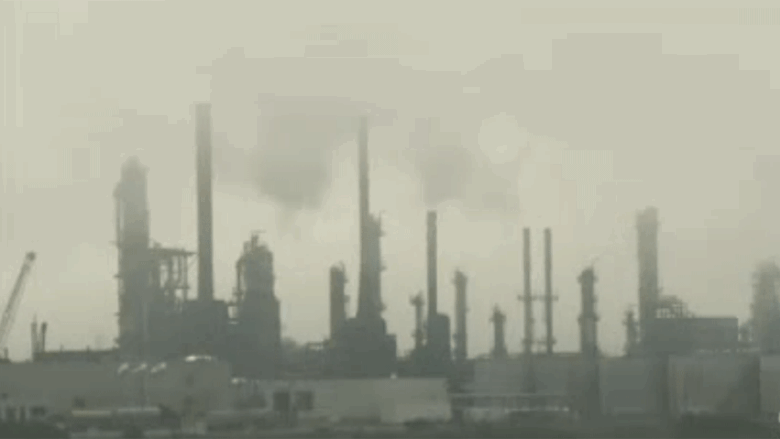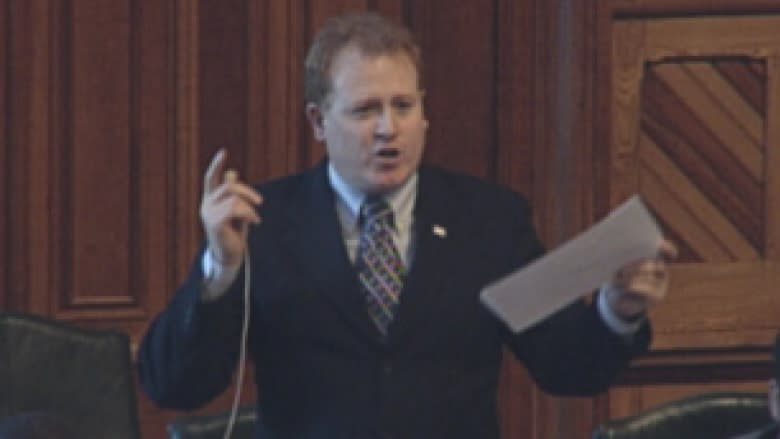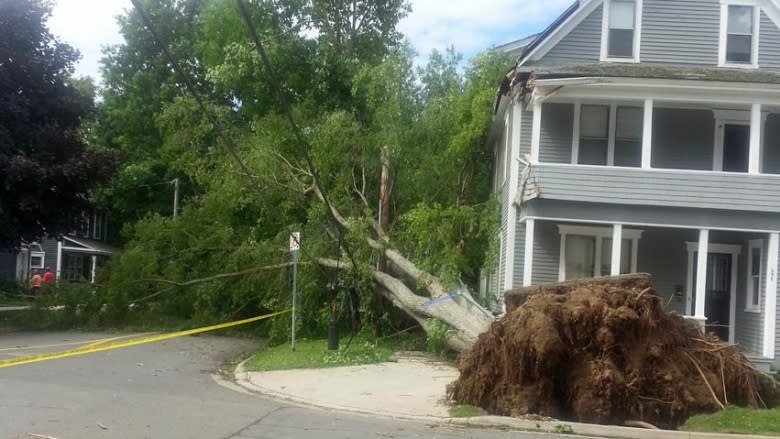New Brunswick lags on greenhouse gas emissions target
New Brunswick's position as a leading national reducer of greenhouse gas emissions is in danger of slipping away with the province set to miss its 2020 reduction commitments by a wide margin, government documents obtained by CBC News reveal.
The province has pledged to cut emissions 10 per cent below 1990 levels by 2020, which would be 14.5 megatonnes of greenhouse gases.
New Brunswick was well on its way until recently.
An internal government document from November 2014 obtained through a Right to Information Act request says a gap has been identified to reach its emissions target, which was established in 2001 and reaffirmed in the provincial government's current climate change action plan.
If New Brunswick carries on "business as usual," provincial greenhouse gas reductions will reverse themselves and grow to 17,789 megatonnes of greenhouses gases by 2020, 10 per cent higher than 1990 levels, according to documents.
A dramatic increase in emissions should set off alarm bells for all New Brunswickers, according to Lois Corbett, the executive director of the Conservation Council of New Brunswick.
"We're lagging behind ... We don't have a good enough plan to help us meet the targets, but here we are thinking about more dependency on oil in the form of a pipeline," Corbett said.
Premier Brian Gallant has voiced strong support for the Energy East pipeline, which would transport Alberta crude to Irving Oil Ltd.'s refinery in Saint John.
City officials are hoping it may spur the construction of a heavy oil upgrader, which would increase provincial greenhouse gas emissions substantially.
Government documents say the proposed Energy East pipeline and Sisson Brook open pit mine would contribute to a "high greenhouse gas emission scenario."
New Brunswick already has the third highest greenhouse gas emissions per capita in Canada.
Government says it needs to do more
Environment and Local Government Minister Brian Kenny said in a statement to CBC News the provincial government plans to do more to reduce greenhouse gases.
"While we are making progress in New Brunswick towards our 2020 emission targets, we need to do more," Kenny said.
"We are committed to working with New Brunswickers to enhance our plan to address climate change and will also collaborate with our counterparts across the country to help determine best practices going forward."
The former Progressive Conservative government released the current climate change action plan last year, it spans from 2014 to 2020.
It doesn't include any regulatory or fiscal measures. It focuses on making a shift towards low-carbon technologies, energy retrofits of public buildings and enhancing the management and tracking of greenhouse gas emissions.
Green Party Leader David Coon says the premier needs to address how the provincial government will tackle emissions sooner rather than later.
"This is the biggest challenge of our time...and we're not hearing that sense of urgency from our own government," Coon said.
Since coming into office, Gallant has introduced a moratorium on hydraulic fracturing, which would ultimately reduce emissions levels.
Other provinces fall behind: document
The Yukon, Alberta, Saskatchewan, Quebec and Newfoundland and Labrador were identified in the internal government document as other regions that are not on track or will find it a challenge to meet provincial/territorial greenhouse gas emissions targets.
It stated the Northwest Territories, British Columbia, Manitoba and Ontario are expected to meet targets and Nova Scotia may even exceed its 2020 greenhouse gas reductions commitment.
Prince Edward Island isn't rated in the document and Nunavut doesn't have a greenhouse gas reductions target.
Provinces and territories have varying degrees of targets, some are more ambitious than others. New Brunswick's reductions target is aligned with Nova Scotia, Newfoundland and Labrador and Prince Edward Island.
David McLaughlin, the former president of the National Round Table on the Environment and the Economy and former chief of staff to premier Bernard Lord, said Canadians can brace for more extreme weather conditions if provinces don't meet targets.
"It does matter if we want to stop climate change or if we want to arrest it and get it into a place where we don't have to expect this kind of dangerous climate change ... it matters that everybody plays its part to meet our national and international obligations," McLaughlin said.
Canada’s commitment under the Copenhagen Accord is to cut emissions 17 per cent below 2005 levels by 2020, which is aligned with the United States.
Industrial, transportation emissions increase
There's been an overall reduction in greenhouse gas emissions in New Brunswick in recent years, but industrial and transportation emissions — two of the largest sources of greenhouse — have increased, according to a briefing note to the former minister of environment.
The Conservation Council's Corbett says New Brunswick needs to introduce legislation to reduce industrial and transportation emissions, instead of waiting for the federal sector-by-sector approach to kick in.
"I think there's been a reliance too long in New Brunswick on hoping that the federal government will move in and put a cap on industrial emissions," according to Corbett.
"When are we going to stop believing the myth that the feds are going to take some action on climate change?" Corbett said.
Both Corbett and Coon expect New Brunswick's latest emissions numbers, to be released by Environment Canada in the spring, to be higher than the previous year because of the large amount of oil that was burned at the Coleson Cove Generating Station during the province's long winter.
Target out of sight?
Coon says it's possible to reach the 2020 target, but only if the provincial government takes immediate action.
"If the province regulates Irving Oil's emissions, if it tackles Belledune emissions and if it tackles baseboard heating, to help people get off baseboard heating, we can do it," Coon said.
"If those three things aren't priorities, we won't meet the target."
Electric baseboard heating forces NB Power to fire up production at its oil-fired power plants in the winter.
Belledune is a coal-fired generating station, north of Bathurst.
Corbett says it's possible for New Brunswick to reach its emissions reductions if NB Power converts Belledune to a more green source of energy, such as biomass, as Ontario has done.
Progressive Conservative MLA Brian Keirstead, the opposition's environment critic, said the province is already on track to achieve its emissions targets.
"If the status quo sticks, we could very well be reaching our goal," Keirstead said.
New Brunswick's emissions target for 2050 is 75 to 85 per cent below 2001 levels, which would be 3.5 to 5.5 megatonnes of greenhouse gases.
New Brunswick emitted 16.4 megatonnes of greenhouse gases in 2012. It met its target that year, which was to reach 1990 levels.
Provincial action plan status internal government document




